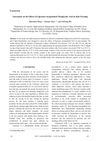 January 2014 in “Revista del Centro Dermatológico Pascua”
January 2014 in “Revista del Centro Dermatológico Pascua” Male pattern baldness is not a risk factor for heart disease based on cholesterol levels alone.
 6 citations,
May 2023 in “European journal of pharmaceutical sciences”
6 citations,
May 2023 in “European journal of pharmaceutical sciences” Niosomes are the most effective at delivering drugs to the skin with minimal absorption into the body.
September 2017 in “The journal of investigative dermatology/Journal of investigative dermatology” Transglutaminase 2 may control sebocyte maturation and lipid metabolism.
 45 citations,
February 2011 in “Journal of the European Academy of Dermatology and Venereology”
45 citations,
February 2011 in “Journal of the European Academy of Dermatology and Venereology” People with lichen planus have higher bad cholesterol and lower good cholesterol, increasing their risk for heart disease.
 January 2014 in “Sen i Gakkaishi”
January 2014 in “Sen i Gakkaishi” Liposome-encapsulated thioglycolic acid improves hair perming effectiveness and durability.
 2 citations,
March 2020 in “International Journal of Molecular Sciences”
2 citations,
March 2020 in “International Journal of Molecular Sciences” Topical treatments can deliver active molecules to skin stem cells, potentially helping treat skin and hair disorders, including skin cancers and hair loss.
 70 citations,
July 2020 in “Pharmacological Reports”
70 citations,
July 2020 in “Pharmacological Reports” Cepharanthine, a Japanese hair loss drug, shows promise as a COVID-19 treatment but needs more testing.
 56 citations,
September 2013 in “Experimental Dermatology”
56 citations,
September 2013 in “Experimental Dermatology” The guide explains how to study human and mouse sebaceous glands using various staining and imaging techniques, and emphasizes the need for standardized assessment methods.
 April 2021 in “Journal of Investigative Dermatology”
April 2021 in “Journal of Investigative Dermatology” Bacteria can help skin regenerate through a process called IL-1β signaling.
 58 citations,
October 2016 in “Journal of Investigative Dermatology”
58 citations,
October 2016 in “Journal of Investigative Dermatology” Activating Nrf2 protects human hair follicles from oxidative stress and helps prevent hair growth inhibition.
 94 citations,
September 2014 in “Therapeutic Delivery”
94 citations,
September 2014 in “Therapeutic Delivery” Nanoparticles can improve skin treatments by better targeting hair follicles, but more research is needed for advancement.
October 2023 in “International journal of molecular sciences” Key proteins and pathways regulate wool fiber diameter in Alpine Merino sheep.
2 citations,
August 2014 in “Journal of dermatological science” Adapalene 0.1% effectively reduces acne by decreasing comedones and altering skin properties.
 December 2021 in “Signal transduction and targeted therapy”
December 2021 in “Signal transduction and targeted therapy” Increasing sebum production might help reduce fat and improve metabolism.
 2 citations,
July 2011 in “Journal of the Egyptian Women's Dermatologic Society (Print)”
2 citations,
July 2011 in “Journal of the Egyptian Women's Dermatologic Society (Print)” Eating nuts, chocolate candy, and red tea might worsen acne, while eating more fresh vegetables could reduce it.

The document concludes that understanding hair's composition and the effects of treatments can lead to better hair care products.
 2 citations,
March 2017 in “Veterinary dermatology”
2 citations,
March 2017 in “Veterinary dermatology” Herbal paste and oil extract might improve dog hair quality by retaining lipids.
 1 citations,
January 2017 in “Journal of rare disease research & treatment”
1 citations,
January 2017 in “Journal of rare disease research & treatment” Obesity is common in PCOS patients and early treatment is important for their heart and metabolic health.
 April 2019 in “The journal of investigative dermatology/Journal of investigative dermatology”
April 2019 in “The journal of investigative dermatology/Journal of investigative dermatology” DHT may reduce inflammation caused by certain bacteria in skin cells.
 April 2024 in “Journal of ethnopharmacology”
April 2024 in “Journal of ethnopharmacology” Ellagic acid may help regrow hair and prevent hair loss by activating a specific cell growth pathway.
26 citations,
January 2016 in “Indian journal of endocrinology and metabolism” Both metformin and pioglitazone improve PCOS symptoms, but pioglitazone is a good alternative for those who can't take metformin.
 1 citations,
February 2013 in “InTech eBooks”
1 citations,
February 2013 in “InTech eBooks” Genetic mutations cause various hair diseases, and whole genome sequencing may reveal more about these conditions.
 17 citations,
October 2017 in “Scientific reports”
17 citations,
October 2017 in “Scientific reports” Fine wool sheep have more genes for wool quality, while coarse wool sheep have more for skin and muscle traits.

Antioxidant therapy, especially with selenium, can improve skin aging in patients with Metabolic Syndrome.
 April 2024 in “Research Square (Research Square)”
April 2024 in “Research Square (Research Square)” 16-MHA can restore the barrier and moisture of damaged hair, making it similar to undamaged hair.
January 2020 in “Brazilian Journal of Health and Pharmacy” Nanostructured lipid carriers can improve finasteride delivery for better hair loss treatment.
The best way to apply vitamin C to the skin is with a nanostructured lipid carrier formulation.
 July 2024 in “Journal of Investigative Dermatology”
July 2024 in “Journal of Investigative Dermatology” Losing both ERBB2 and ERBB3 receptors in mice causes significant skin problems and inflammation.
 26 citations,
March 2014 in “International journal of pharmaceutics”
26 citations,
March 2014 in “International journal of pharmaceutics” Researchers created a skin treatment that could effectively deliver medication into hair follicles.
2 citations,
March 2023 in “Journal of Public Health in Africa” Combining beeswax and oleum cacao in the carrier system boosts hair growth.























